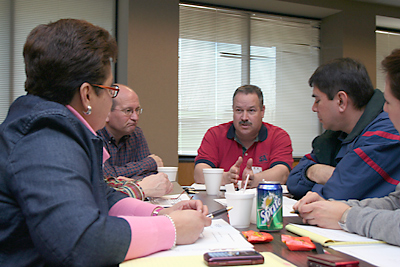
 WHITE OAK—Today’s Catholic teenagers are more stressed, family-oriented, and steeped in technology than the two generations that preceded them. As a result, they also present a unique challenge when it comes to youth ministry.
WHITE OAK—Today’s Catholic teenagers are more stressed, family-oriented, and steeped in technology than the two generations that preceded them. As a result, they also present a unique challenge when it comes to youth ministry.
The current crop of youth falls into a generation born between 1982 and 2002 that’s been dubbed the Millennial Generation. They were the focus of “Ministry with Millennials,” a special day of education for directors of religious education and youth ministers held March 4 at White Oak Conference Center. The event was sponsored by the Diocese of Charleston’s office of Youth and Young Adult Ministry.
The session was led by Frank Mercadante, a former youth leader who is now an author and executive director of Illinois-based Cultivation Ministries, which helps student and adult Catholic youth leaders develop effective programs.
“Many people have had to almost rewrite how they do youth ministry in the past seven or eight years,” he said.
 Mercadante said Catholic youth programs in the past 30 years have been geared toward teens who felt alienated from their parents and wanted their own space.
Mercadante said Catholic youth programs in the past 30 years have been geared toward teens who felt alienated from their parents and wanted their own space.
“We all remember the Baby Boomer phrase, ‘Never trust anyone over 30,’” he said. “During the time of the Boomers and then Generation X, people assumed that kids were rebellious, that they needed space away from their parents.”
Many Millennials, on the other hand, have been closely monitored and nurtured by their parents from birth, and spend much of their time in scheduled activities run by adults.
“This generation is used to interacting with and working alongside adults,” Mercadante said. They also are much more likely than the teens of just a decade ago to say that they feel close to their parents, can talk to them and trust them.
Some Millennials, he said, might respond better to programs that focus on involvement by the entire family, rather than those designed to isolate teens into their own circle within the parish.
He said many Millennials are often willing to follow rules, value academic achievement, and want to take part in volunteer work and other activities that serve the common good. Some negatives about the generation include a sense of entitlement and over-scheduled lives.
Millennials also relate to the world in some profoundly different ways, he said. This is the first generation to grow up almost exclusively with “postmodernism,” a mindset which relies on feelings, relationships, intuitions and experiences as a way of determining what is true.
The Millennials also are the first to grow up in an era when the primary mode of communication is transitioning from print and broadcast media to digital.
Digital media is on a smaller scale, more interactive and can be tailored to fit more individual preferences than print or broadcast ever could, he said. In a world of social networking and text-messaging, Millennials are simultaneously isolated behind their keyboards or computer screens, but also instantly able to be in touch with huge networks of their peers.
The result of this change is a generation of Catholic teens seeking a faith that offers them a real, profound experience of Christ’s love in their daily lives. While Generation X spirituality led to the development of mega-churches with video screens and high-tech presentation, Mercadante said Millennial Catholics are looking for smaller experiences, an intimate encounter with God that also allows them to feel part of a larger faith community.
“Today’s teens have grown up in a really positive time for kids,” Mercadante said in an interview with The Miscellany. “Children are more protected these days, their struggles are given a lot of attention, and they tend to be the full focus of their parents’ lives. However, sometimes when they go into our parishes, they might not feel like they’re treated in a similar manner. Sometimes they feel pretty anonymous.”
He said youth ministers should focus on three things to remain relevant to Millennials: give them meaningful experiences in their parish, help them have a sense of belonging in the parish, and give them ways to use their gifts in a meaningful way.
He said Millennials put a huge value on life experience. Consequently, he said, they don’t want to hear talks about the importance of prayer or the Catholic idea of social justice. Instead, these teens respond to experiencing different forms of prayer or taking part in hands-on projects to help the needy.
“The key is having a parish that is full of vitality,” Mercadante said. “There’s not one magic youth activity that is going to attract everyone. The focus shouldn’t be the activities, but the culture surrounding them. The key is to have programs that emphasize discipleship and mission, that help young people to have a relationship with Jesus and with one another. They feel a need for a church where they have a real experience of God.”
